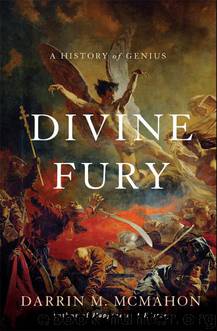Divine Fury by Darrin M. McMahon

Author:Darrin M. McMahon [McMahon, Darrin M.]
Language: eng
Format: epub
ISBN: 9780465069910
Publisher: Basic Books
Published: 0101-01-01T00:00:00+00:00
CHAPTER VI
THE RELIGION OF GENIUS
IN THE MID-NINETEENTH CENTURY, the Danish philosopher Søren Kierkegaard published a short essay with an intriguing title, “On the Difference Between a Genius and an Apostle.” Like so many of Kierkegaard’s occasional writings, the essay called attention to what he regarded as a disturbing tendency of the present age. Science and learning had confused Christianity, he charged, with the result that religious discourse was adopting science’s terms. Pastors now described the likes of Saint Paul as a “genius,” hailing his brilliance and lauding his style. The praise was well intentioned, but the consequence was a fatal conflation: “Esprit and the Spirit, revelation and originality, a call from God and genius, all end by meaning more or less the same thing.” In truth, Kierkegaard insisted, a “genius and an Apostle are qualitatively different.” A man like St. Paul “has no connection whatsoever with Plato or Shakespeare.”1
Kierkegaard’s essay was prompted by the case of the contemporary Danish pastor and philosopher Adolph Peter Adler, who claimed to have received a new revelation from God, and then amended the account under scrutiny, explaining it as a revelation of genius instead. But as Kierkegaard well knew, confusion of this kind was by no means an isolated occurrence: across Europe in the nineteenth century, Christian apologists lauded the heroes of their faith in similar terms, concurring with the abbé Louis Bautain, who observed that “it is by men of genius, prophets, poets, apostles . . . that the life of heaven has been communicated to humanity since the beginning.” Among Protestants, Martin Luther emerged in the nineteenth century as a robust example of the Christian genius. At the same time, Catholics redefined their own prophets and saints, calling attention on occasion, in a pious nod to the science of the time, to signs of holy madness and enthusiasm as symptoms of an underlying genius. True, only skeptics dared suggest that Jesus himself suffered from a morbid pathology. But disciples and disbelievers alike could agree that Jesus was a “great man” and an “original genius,” a claim that was increasingly common in the nineteenth and early twentieth centuries (to say nothing of our own). When Ernest Renan penned his controversial biography of Jesus, La vie de Jésus, in 1863, he followed David Friedrich Strauss in making that claim central to his account, prompting the withering scorn of Nietzsche, who later observed that the “concept of genius” was completely inappropriate when applied to the “Jesus type.”2
With that much, at least, Kierkegaard would have agreed, for as he rightly appreciated, to apply the label “genius” to an apostle of God was to recognize a standard of authority that was human, not divine. Just as it would be treason “to ask whether a king is a genius” as a condition of loyalty, or it would be an act of filial rebellion to maintain that “I obey my father, not because he is my father but because he is a genius,” it was misconceived to base the divinely conferred power of an apostle on aesthetic or intellectual grounds.
Download
This site does not store any files on its server. We only index and link to content provided by other sites. Please contact the content providers to delete copyright contents if any and email us, we'll remove relevant links or contents immediately.
| Buddhism | Christianity |
| Ethnic & Tribal | General |
| Hinduism | Islam |
| Judaism | New Age, Mythology & Occult |
| Religion, Politics & State |
Cecilia; Or, Memoirs of an Heiress — Volume 1 by Fanny Burney(31355)
Cecilia; Or, Memoirs of an Heiress — Volume 3 by Fanny Burney(30952)
Cecilia; Or, Memoirs of an Heiress — Volume 2 by Fanny Burney(30909)
The Secret History by Donna Tartt(16675)
Sapiens: A Brief History of Humankind by Yuval Noah Harari(13086)
Leonardo da Vinci by Walter Isaacson(11927)
The Radium Girls by Kate Moore(10923)
Sapiens by Yuval Noah Harari(4560)
The Wind in My Hair by Masih Alinejad(4430)
How Democracies Die by Steven Levitsky & Daniel Ziblatt(4426)
Homo Deus: A Brief History of Tomorrow by Yuval Noah Harari(4293)
Endurance: Shackleton's Incredible Voyage by Alfred Lansing(3857)
The Silk Roads by Peter Frankopan(3794)
Man's Search for Meaning by Viktor Frankl(3656)
Millionaire: The Philanderer, Gambler, and Duelist Who Invented Modern Finance by Janet Gleeson(3577)
The Rape of Nanking by Iris Chang(3530)
Hitler in Los Angeles by Steven J. Ross(3450)
The Motorcycle Diaries by Ernesto Che Guevara(3348)
Joan of Arc by Mary Gordon(3272)
